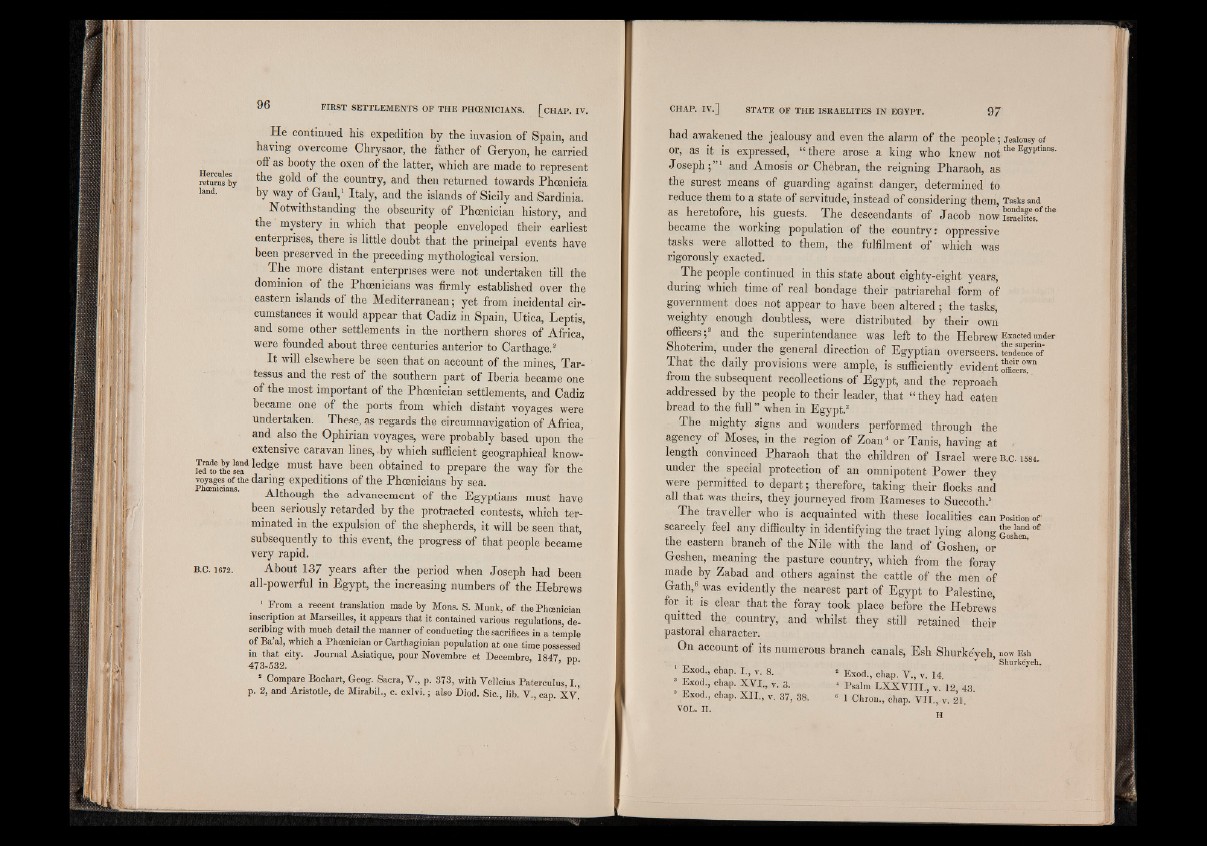
He continued his expedition by the invasion of Spain, and
having overcome Chrysaor, the father of Geryon, he carried
off as booty the oxen of the latter, which are made to represent
returroby country, and then returned towards Phoenicia
land. by way of Gaul,1 Italy, and the islands of Sicily and Sardinia.
Notwithstanding the obscurity of Phoenician history, and
the mystery in which that people enveloped their earliest
enterprises, there is little doubt that the principal events have
been preserved in the preceding mythological version.
The more distant enterprises were not undertaken till the
dominion of the Phoenicians was firmly established over the
eastern islands of the Mediterranean; yet from incidental circumstances
it would appear that Cadiz in Spain, Utica, Leptis,
and some other settlements in the northern shores of Africa,
were founded about three centuries anterior to Carthage.2
It will elsewhere be seen that on account of the mines, Tar-
tessus and the rest of the southern part of Iberia became one
of the most important of the Phoenician settlements, and Cadiz
became one of the ports from which distant voyages were
undertaken. These, as regards the circumnavigation of Africa,
and also the Ophirian voyages, were probably based upon the
extensive caravan lines, .by which sufficient geographical know-
MtotheSdledge must have beert obtained to prepare the way for the
voyages of the daring expeditions of the Phoenicians by sea.
Although the advancement of the Egyptians must have
been seriously retarded by the protracted contests, which terminated
in the expulsion of the shepherds, it will be seen that,
subsequently to this event, the progress of that people became
very rapid.
B.c. 1672. About 137 years after the period when Joseph had been
all-powerful in Egypt, the increasing numbers of the Hebrews
1 From a recent translation made by Mons. S. Munk, of the Phoenician
inscription at Marseilles, it appears that it contained various regulations describing
with much detail the manner of conducting the sacrifices in a temple
o f Ba’al, which a Phoenician or Carthaginian population at one time possessed
in that city. Journal Asiatique, pour Novembre et Decembre 1847 dd
473-532.
! Compare Bochart, Geog. Sacra, V., p. 373, with Velleius Paterculus, L
p. 2, and Aristotle, de Mirabil., c. cxlvi.; also Diod. Sic., lib. V., cap. X v ’
had awakened the jealousy and even the alarm of the people; jealousy of
or, as it is expressed, “ there arose a king who knew nottheEgyptians‘
Joseph;”1 and Amosis or Chebran, the reigning Pharaoh, as
the surest means of guarding against danger, determined to
reduce them to a state of servitude, instead of considering them, Tasks and
as heretofore, his guests. The descendants of Jacob n owK § s? ftIie
became the working population of the country: oppressive
tasks were allotted to them, the fulfilment of which was
rigorously exacted.
The people continued in this state about eighty-eight years,
during which time of real bondage their patriarchal form of
government does not appear to have been altered; the tasks,
weighty enough doubtless, were distributed by their own
officers; and the superintendance was left to the Hebrew Exacted under
Shoterim, under the general direction of Egyptian overseers, ^dencfof
That the daily provisions were ample, is sufficiently evident officers'™
from the subsequent recollections of Egypt, and the reproach
addressed by the people to their leader, that “ they had eaten
bread to the full ” when in Egypt.3
The mighty signs and wonders performed through the
agency of Moses, in the region of Zoan4 or Tanis, having at
length convinced Pharaoh that the children of Israel were b.c. issi.
under the special protection of an omnipotent Power they
were permitted to depart; therefore, taking their flocks and
all that was theirs, they journeyed from Raineses to Succoth.5
The traveller who is acquainted with these localities can Position o f
scarcely feel any difficulty in identifying the tract lying along Gosh?4 °f
the eastern branch of the Nile with the land of Goshen, or ** ^
Geshen, meaning the pasture country, which from the foray
made by Zabad and others against the cattle of the men of
Gath,6 was evidently the nearest part of Egypt to Palestine,
for it is clear that the foray took place before the Hebrews
quitted the. country, and whilst they still retained their
pastoral character.
On account of its numerous branch canals, Esh Shurkeyeh, now Esh
Shurkeyeh.
1 Exod., chap. I., y. 8. 2 Exod., chap. V., v. 14.
3 Exod., chap. X V I,, v. 3. 4 Psalm L X X V I I I., v 12 43
5 Exod., chap. X I I ,, v. 37, 38. 3 1 Chron., chap. V II., v. 21
VOL. II . H